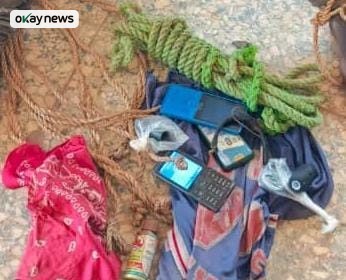Officials of the National Agency for Food and Drug Administration and Control (NAFDAC) have arrested two individuals in Jos, Plateau State, for allegedly changing expiry dates on expired wines and alcoholic drinks. The operation, which took place between Friday and Saturday, targeted a warehouse located in the Apata community.
According to NAFDAC, the raid was part of a nationwide enforcement effort to safeguard the health of Nigerians and ensure that only safe and genuine products reach consumers, particularly ahead of the festive season.
Okay News reports that the Director of NAFDAC’s North Central Zone, Mr. Kenneth Azikiwe, led the operation and confirmed the arrests. He said the suspects were found altering the expiry and manufacturing dates on expired products to deceive buyers.
“We’re here to address a disturbing trend where certain individuals are changing dates on expired products to resell them,” Azikiwe stated. “They use chemicals to clean off the original labels, then apply fake expiry dates to make the items look new. One consumer’s report led our team to this location.”
He added that the two suspects, identified as Yusuf Hassan and Emma Nwobi, were caught in possession of relabeled drinks and are being interrogated, while others connected to the operation are still being traced.
“We have Yusuf, who handled the date changes, and the warehouse owner, who provided the fake labels. Our agency is intensifying surveillance in markets, supermarkets, and distribution points to ensure no harmful products reach the public,” he said.
Azikiwe also noted that NAFDAC’s Director General, Prof. Mojisola Christianah Adeyeye, had instructed all regional offices to be extra vigilant as part of the agency’s year-end safety campaign.
The Plateau State Coordinator of NAFDAC, Dr. Obida Musa, condemned the suspects’ actions, calling it “a reckless and criminal act that endangers innocent lives.” He urged consumers to always check expiry and manufacturing details printed directly on product packaging instead of relying on stickers, which are often used to mislead.
Musa also appealed to the public to report suspicious products or sales outlets to NAFDAC for swift investigation.
One of the suspects, Yusuf Hassan, however, pleaded for leniency. He claimed ignorance of the tampering, saying he only supplied the products to customers without realizing the dates had been changed.
“I didn’t know the expiry date had been altered,” Hassan said. “I only bought the drinks from a supplier named Emma Nwobi, who told me they were still good for sale. The original expiry date was 2020, but it was changed to 2027. I’m pleading for forgiveness because this is my first time.”
Okay News gathered that NAFDAC is currently conducting similar operations across Nigeria to eliminate expired, falsified, and unregistered goods from circulation. The agency recently removed products worth over one trillion naira from open drug markets in Idumota (Lagos), Aba (Abia State), and Onitsha (Anambra State) as part of its national enforcement drive.







